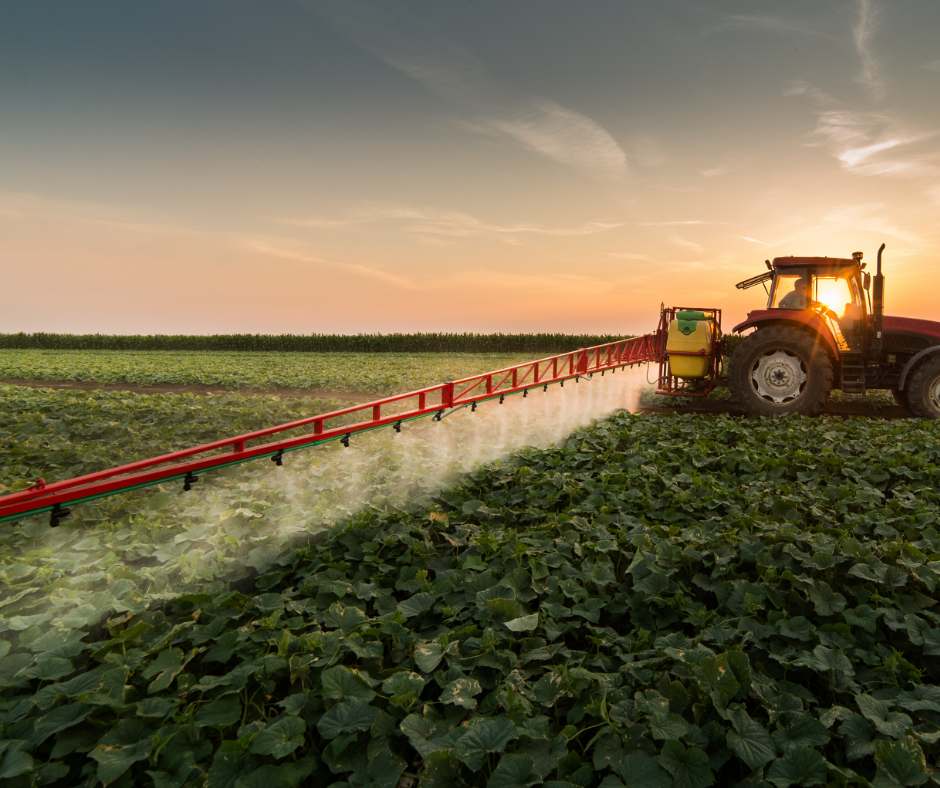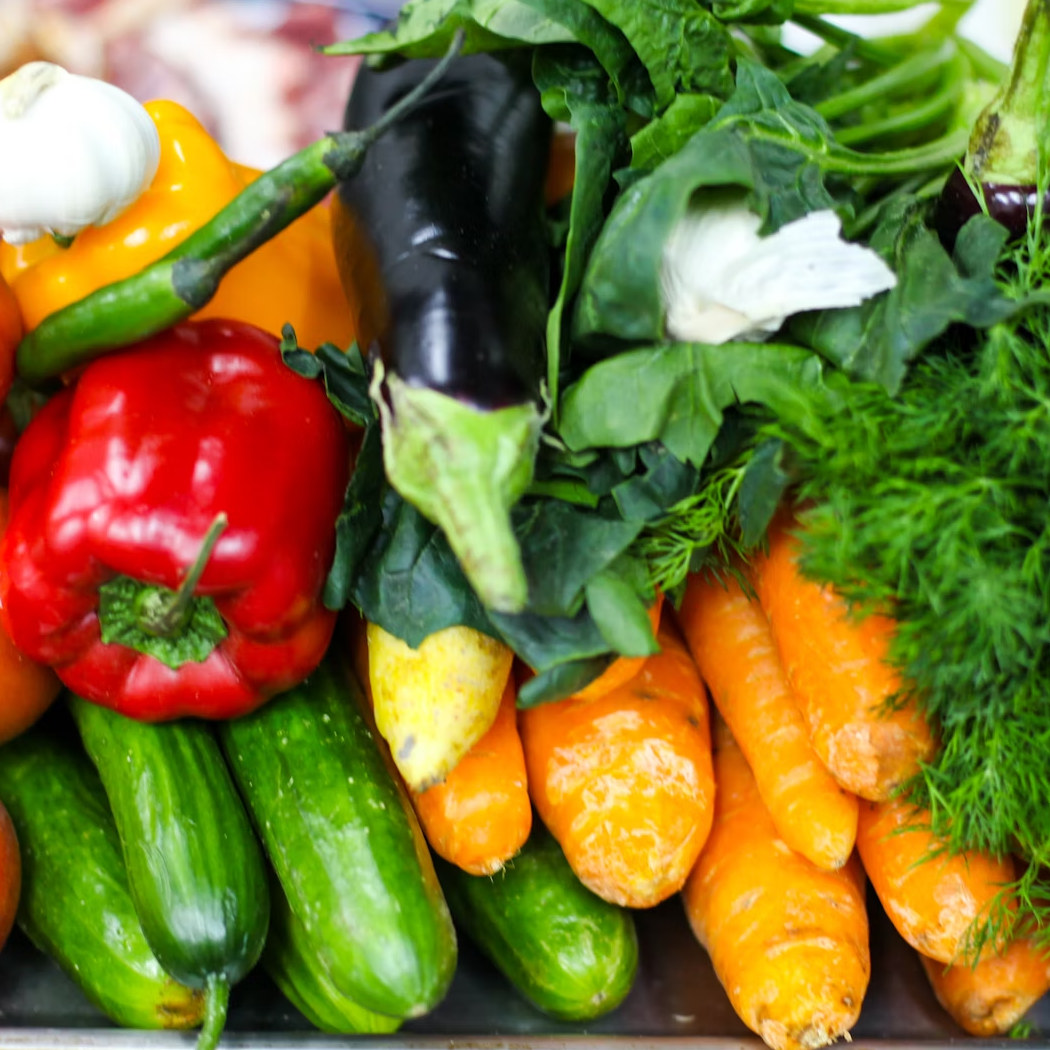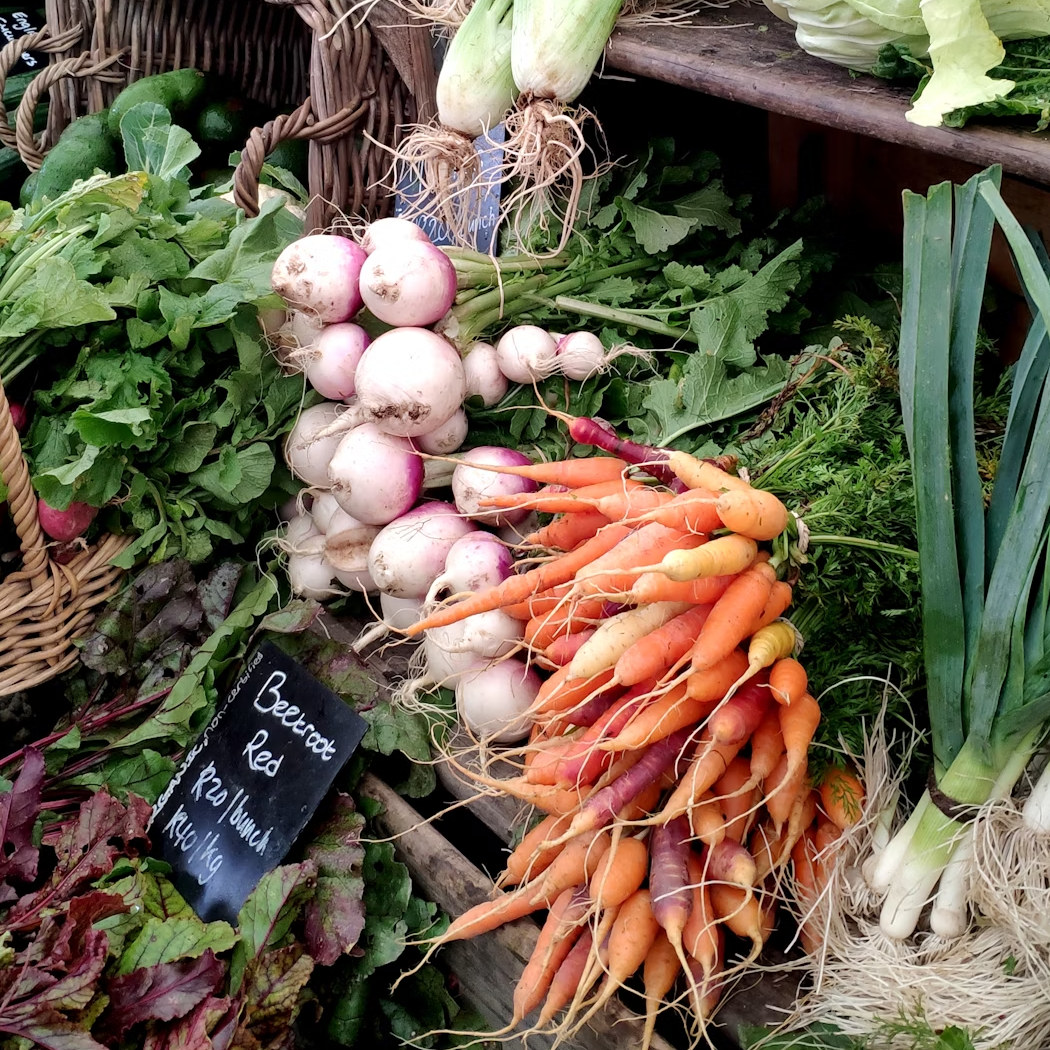News
Pesticides. What you need to know, the dangers to human health and how to avoid them.
August 17, 2020

The difference between pesticides and herbicides
Pesticides are either man-made, synthetic or natural chemical like substances used in food and agriculture to kill pests, weeds, insects, rodents, fungi, bacteria or anything that may slow down or endanger the production of farmers crops.
Herbicides and all the other ‘cides’ for example; fungicides, insecticides, parasiticides ect. can all technically fall under the umbrella of pesticides. Herbicides specifically target weeds, hence the name ‘herb’icides.
The evolution of pesticides
Image By hedghog94
When you think of the word pesticide you might envision a farmer suited up from head to toe, in a white hazmat style suit. You may then think about the spraying of chemicals over farmland to keep all the bugs, critters, and creepy crawlies away from the crops.
Do you think about the health of the farmer spraying the chemicals? What about the destruction it is causing to our ecosystem?
What about the long term impact on human health?
Did you know that in 1945, 45% of households grew their own food in their backyards and were using more ‘organic’ sources of pesticides in the form of garlic, chilli, salt and vinegar.
Today 0.1% of food is grown in backyards.
The era of modern farming has led to chemical farming causing the destruction of our soils, oceans, waterways and even human health.
The good news is, there is hope for our future. Dr Zach Bush believes that we can transform the planet.
“By learning to work in a co-creative process with mother nature and her extraordinary variety of species, farmers and consumers will participate to witness richer soils and more abundance of life and health than has been seen in human history. “
So what can you do right now? The simple solution is to stop supporting conventionally grown produce and farmers using chemicals for their crop production. If we shift our focus to education and supporting our farmers, they will be forced to evaluate their processes and return to those of mother nature. More natural farming practises and processes that work in harmony with the land and all its inhabitants, is definitely the answer for our long term health and sustainability.
What do you need to know when making your decision to switch from conventionally grown produce to supporting more organic farmers?
And more importantly, have our authorities and governing bodies really had human and planetary health in mind when it comes to the chemicals they allow for use?
What are pesticides?
Image By sergei78
According to WHO the World Health Organisation, there are over 1000 pesticides used around the world to protect crops from pests, insects, weeds and fungi. Pesticides are used in modern agriculture to ensure that food is not damaged or destroyed. This inturn increases the yield for farmers. WHO also states explicitly that “Pesticides are potentially toxic to humans and can have both acute and chronic health effects, depending on the quantity and ways in which a person is exposed.” WHO also claims that some pesticides can remain in the soil and our waterways for years.
Who regulates our standards in Australia?
Food Standards Australia New Zealand (FSANZ) sets the standards for the maximum allowed limits of chemical residue present in the foods we consume. This is considered to apply with best industry practice.
I don't know about you, but ‘best’ practice for me is having ZERO amounts of chemicals present in my food.
Pesticides have been described by official government health sites as “toxic chemicals designed to kill agricultural pests”. Numerous sites also state that if consumed in large amounts, pesticides are hazardous to human health. The defense to these claims is that pesticides help to increase crop production, but at what cost?
When looking into this further, the response from our officials and Government sites conclude that as long as appropriate warning signs are visibly clear on the label, with recommended uses, first aid instructions and safety directions including personal protective equipment when handling the product, then they have ticked their box and it is safe for use.
Glyphosate and what you need to know
Image By valio84sl
The Australian Pesticides and Veterinary Medicines Authority reviewed concerns raised over Glyphosate and the probable carcinogenic effects on human health. “The APVMA completed a review of glyphosate in 1997, which set Australia’s health based guidance values at a level that remains protective.” Last reviewed 2019.
The APVMA’s state that “Glyphosate is a broad-spectrum herbicide that works by inhibiting an enzyme found in plants; this enzyme is not found in humans. There are around 500 products containing glyphosate registered for use in Australia. Glyphosate has been registered for use in Australia for over 40 years.” The APVMA also states that products containing Glyphosate in Australia are safe for use according to the label instructions.
What I find Ironic is that France and Italy have said they will ban glyphosate use, along with Germany. Vietnam and Thailand have already banned it.
The EPA still stands by their claim that “there are no risks to public health when glyphosate is used in accordance with its current label and that glyphosate is not a carcinogen”.
Currently in Australia and overseas, there are multiple legal cases against Monsanto claiming that Glyphosate causes cancer.
At the moment, Bayer, the company that brought the roundup maker Monsanto 2 years ago, is paying out $15.9billion to settle cancer claims. According to an article published in March 2020, this will settle 100,000 lawsuits. It was decided that it was in the company Bayers' best interests to settle, to avoid trials, juries and years and years of uncertain litigation.
Some of the stats
-According to a map created by Australian scientists from the University Of Sydney, glyphosate is found nearly everywhere globally, with identified hotspots. These hotspots have been said to be in Europe, China, South-East Asia, North America, South America and Australia.
-According to Zac Bush “It is now estimated that we spray more than 4.5 billion pounds of glyphosate (the active ingredient in Roundup) into the soils, plants, and water systems of our planet.”
Since the introduction of the “roundup ready” crops in the mid-late 1990’s, something alarming began to happen to human health right about the same time. According to Zac;
- Dementia in women increased
- Parkinson’s in men increased
- Autoimmune diseases hit an all time high
- Today, 1 in every 2 people will be diagnosed with cancer before they die
- And 1 in 36 children are now diagnosed with autism, compared to a mere 1 in 5,000 in the 1970’s
What is alarming is that the water soluble toxin glyphosate has worked its way through our planet. It has infiltrated our soil, the groundwater, is present in our rivers, oceans, our air, and even our rainfall. Zac Bush states that it is not surprising that diseases in our domesticated animals, from our pets to livestock, have sadly followed a similar health trajectory to that of humans.
“Soil health is arguably the most important element impacting our health, the health of future generations, and the health of this planet we call home.” Zac Bush Triple board certified M.D
Where can you find glyphosate used?
Image By JasonOndreicka
According to the EPA Agricultural uses of glyphosate include “corn, cotton, canola, soybean, sugar beet, alfalfa, berry crops, brassica vegetables, bulb vegetables, fruiting vegetables, leafy vegetables, legume vegetables, cucurbit vegetables, root tuber vegetables, cereal grains, grain sorghum, citrus crops, fallow, herbs and spices, orchards, tropical and subtropical fruits, stone fruits, pome fruits, nuts, vine crops, oilseed crops, and sugarcane.”
The Nonagricultural uses stated by the EPA include “conservation land, pastures, rangeland, aquatic areas, forests, turf grass, residential areas, non-food tree crops (e.g., pine, poplar, christmas trees), rights of way, commercial areas, paved areas, spot treatments, ornamentals, parks, and wildlife management areas.”
How to minimise your consumption of all pesticides
1. Eat Organically!
And by that we mean certified organic or from farmers that support certified bio-dynamic growing principles, where soil is not tilled and food is grown as mother nature intended.
Findings for a 2018 study published in the JAMA, found that a higher frequency of organic food consumption was associated with a reduced risk of cancer.
2. Get clear or should I say ‘clean’ when it comes to our basic human needs.
Our basic survival needs as human beings are water, shelter and food. I would argue connection should make that list also.
Let's focus on getting the very basics right.
Aside from shelter, we need clean water and nutritious foods to help keep us well and free from disease or illness. If our waterways and agricultural land is poisoned, what does that say for our quality of life?
As clean and as close to mother nature as possible with minimal human tampering. We encourage drinking filtered water that removes heavy metals, pesticides and fluoride. And of course, buy certified organic produce.
3. Build your defense to toxins
As pesticides are everywhere, we are chronically exposed to them on a daily basis whether we like it or not. Our best defense according to Dr AXe is to protect our bodies natural defense mechanisms so we are better able to deal with our exposure, eliminating long-term health effects.
Doctor Axe recommends a diet rich in the following toxic fighting compounds;
-Citrus pectin as it has been said to detoxify heavy metals from the body.
-Glycine found in spinach, cabbage, kale, banana and cauliflower has been said to help support healthy protein production, whilst preventing toxins from being stored in tissues and organs.
-Gingko Biloba is said to be a powerful protector against toxicity.
-Kelp which is a rich source of iodine and other protective minerals that have been said to prevent the absorption of radioactive ions and toxins.
4. Stop using chemicals in your own household and backyard.
This is doing your part in stopping dangerous substances entering our soul, leech into our waterways and cycle back through our precipitation cycle as rain. There are many natural defences to use when gardening and household cleaning. If we stop supporting the bad stuff, then the demand for more natural based products will rise and together we will have stood for something greater than us!
5. Educate yourself!
Knowledge really is power. And us people really do still have the power.
Empower yourself with the latest information to make the most informed decisions when it comes to what you consume and who you choose to support.
None of us really know the lifelong damage or full extent of pesticide use in regards to human health and the health of the planet. Not even the authorities or the makers of these chemicals. If we know they are poisonous and kill nature, then in turn. That’s evidence enough for me.
What we can do is interpret the data out there. Over the last 30 years alone, chronic disease has exploded and has been said to be the worst in human history yet. So what can we change?
Triple Board certified M.D Zac Bush has dedicated his life to regenerative agriculture. He believe in order to reclaim our health and save the planet we need to;
1. Get outside
2. Eat regeneratively
3. Grow organic Communities
4. Diversify your diet
5. Avoid probiotic use
6. Protect your gut
7. Join the regenerative movement
To learn more about glyphosate and the devastating effects it has had on human health, check out; Zach Bush. He has been on a plethora of podcasts and discussed this in detail. My personal favourite is; https://www.richroll.com/podcast/zach-bush-353/
References
World Health Organisaton; https://www.who.int/news-room/fact-sheets/detail/pesticide-residues-in-food
The Australian Pesticides and Veterinary Medicines Authority;
https://apvma.gov.au/node/13891
ABC article; Roundup contamination 'unpreventable', world-first glyphosate research shows (2020); 2020: https://www.abc.net.au/news/rural/2020-03-19/international-glyphosate-roundup-hotspot-map/12063156
ABC article; Glyphosate, Roundup now banned in Australia's fourth-largest grain market of Vietnam (2019); https://www.abc.net.au/news/rural/2019-04-12/vietnam-glyphosate-ban/10996480
Association of Frequency of Organic Food Consumption With Cancer Risk Findings From the NutriNet-Santé Prospective Cohort Study 2018; https://jamanetwork.com/journals/jamainternalmedicine/fullarticle/2707948
Glyphosate Toxicity Alert: How America’s #1 Weedkiller Tricks Your Body Into Absorbing It (2020);
https://draxe.com/health/glyphosate-toxicity/
https://www.epa.gov/ingredients-used-pesticide-products/glyphosate
Zach Bush
https://zachbushmd.com/gmo/glyphosate-toxins/
https://zachbushmd.com/blog/farming/
Cover image By fotokostic
Related Articles
 News
News
New Organic Agriculture Study. Soil treated with organic fertiliz...
October 15, 2024 News
News
Australia is ranked #1 in organic agricultural land usage! Celebr...
September 19, 2024 News
News
Embracing Organic: Celebrating Australian Organic Awareness Month...
September 12, 2024 News
News
